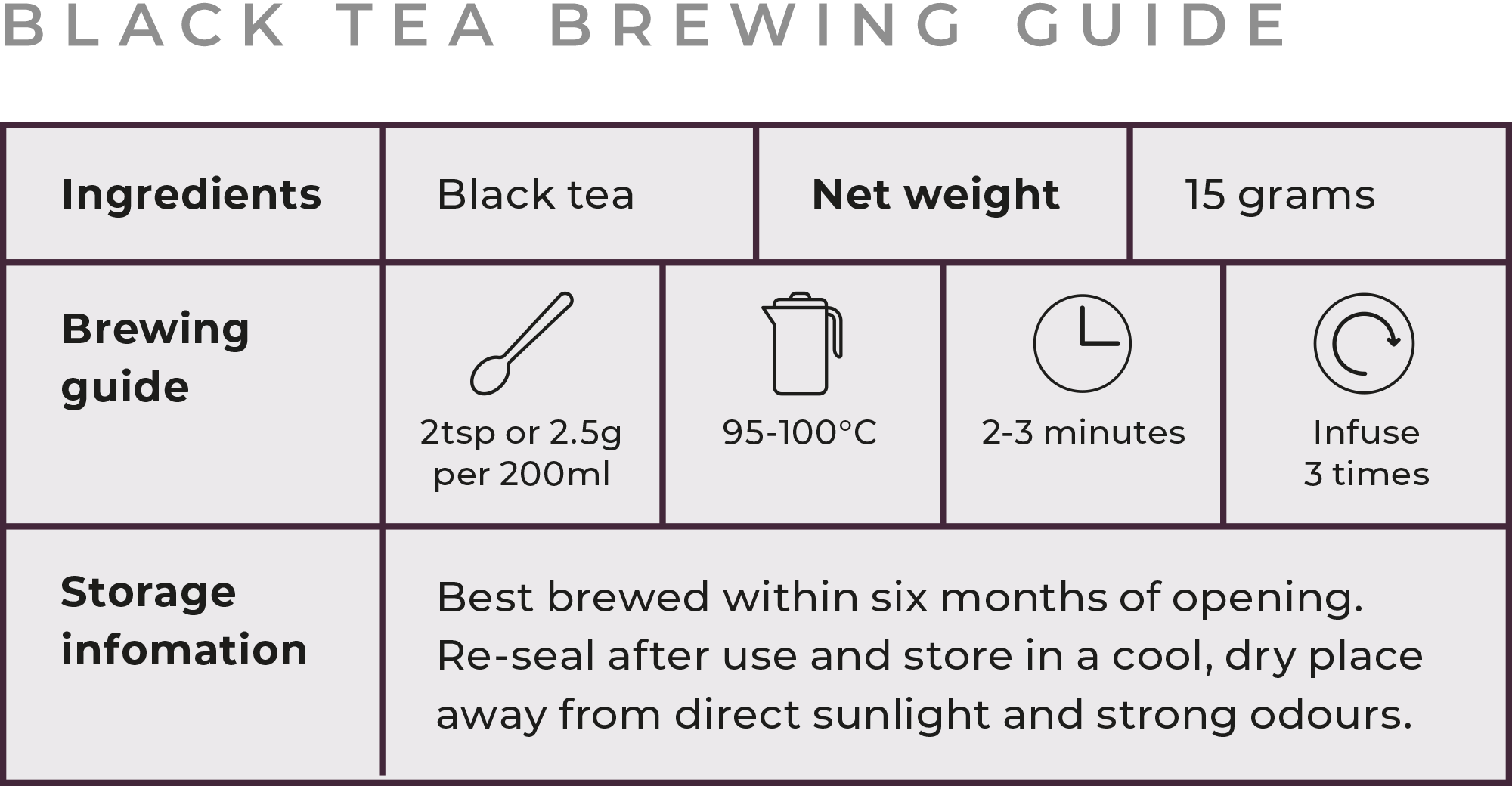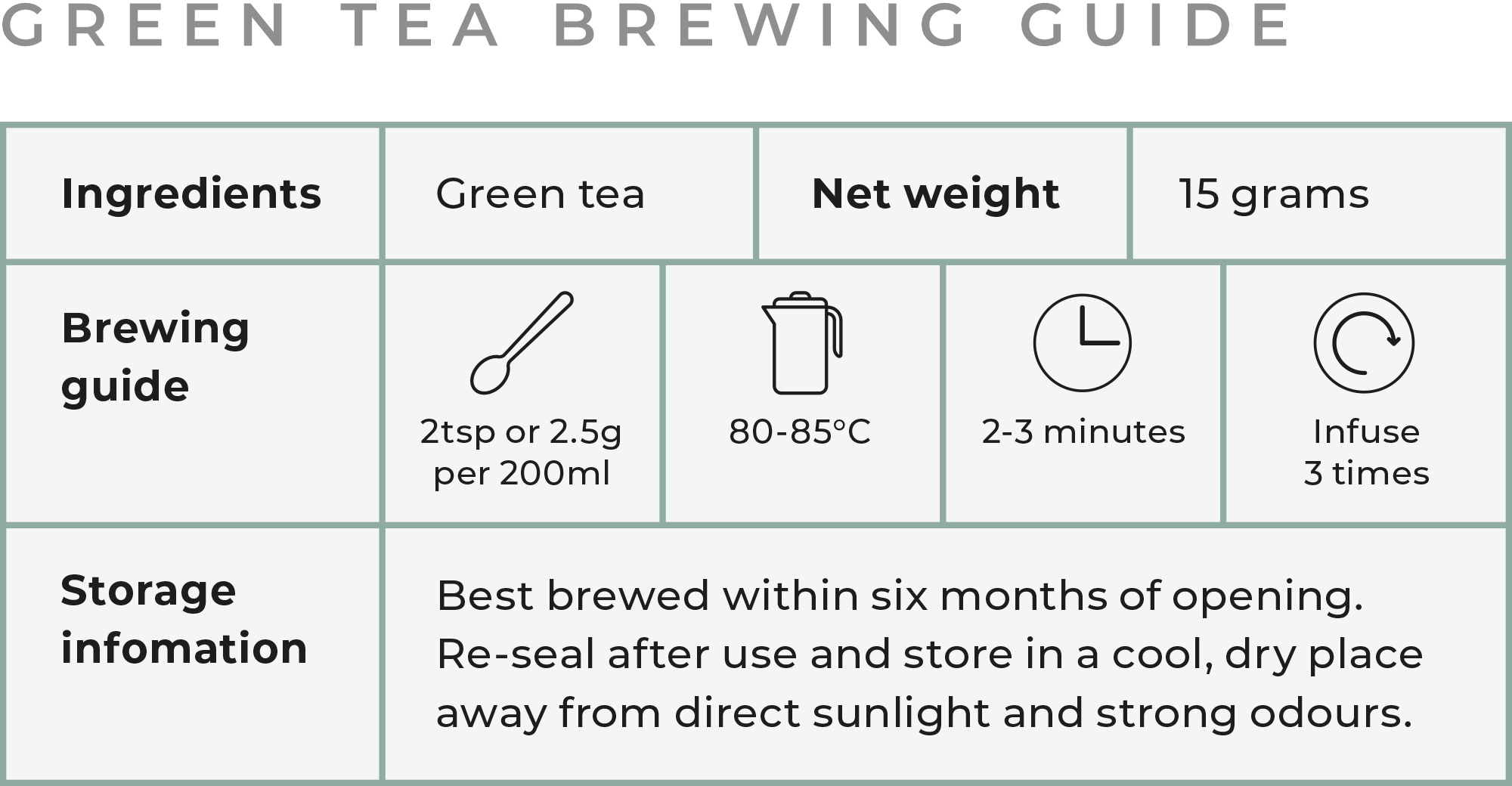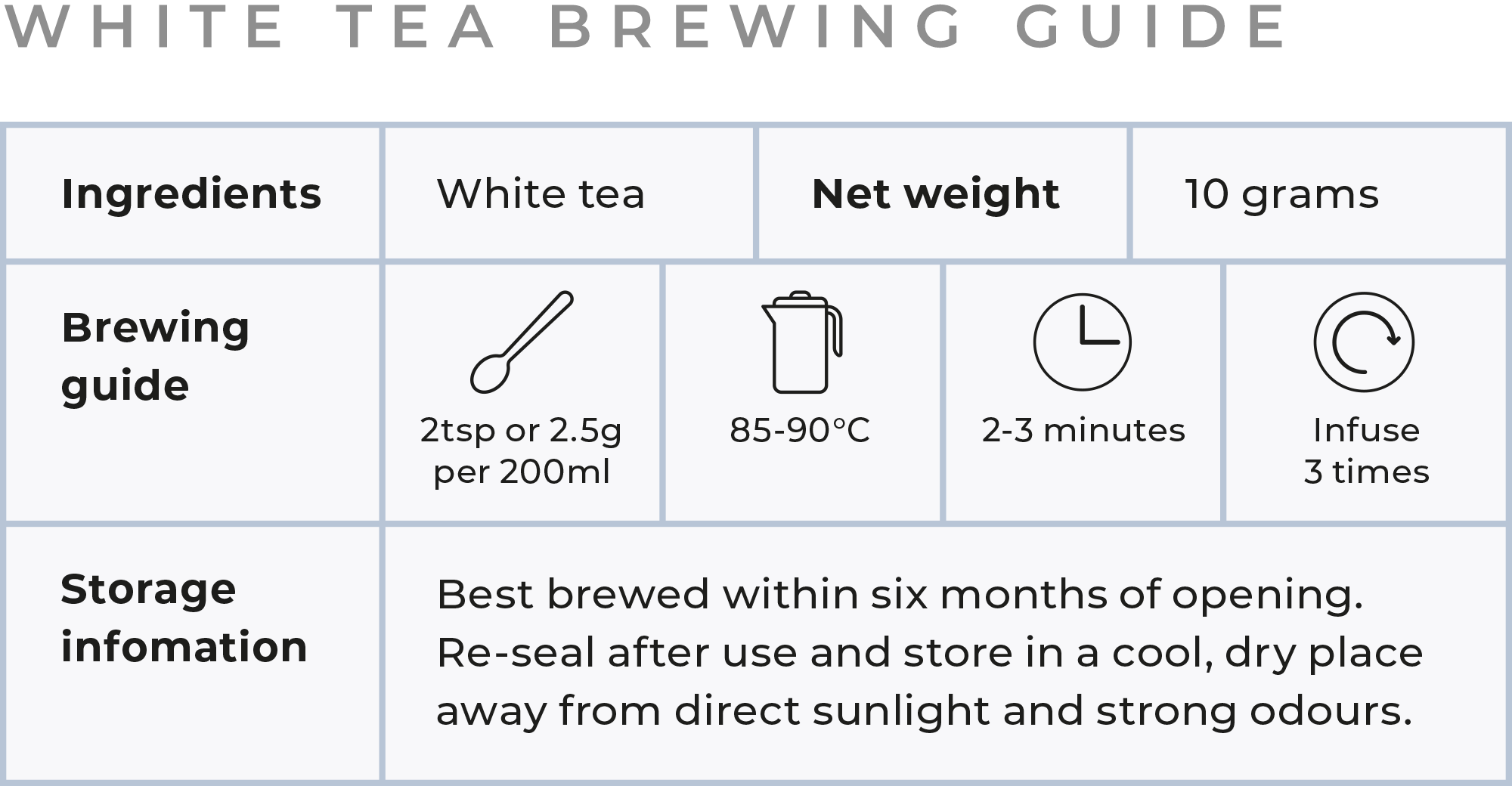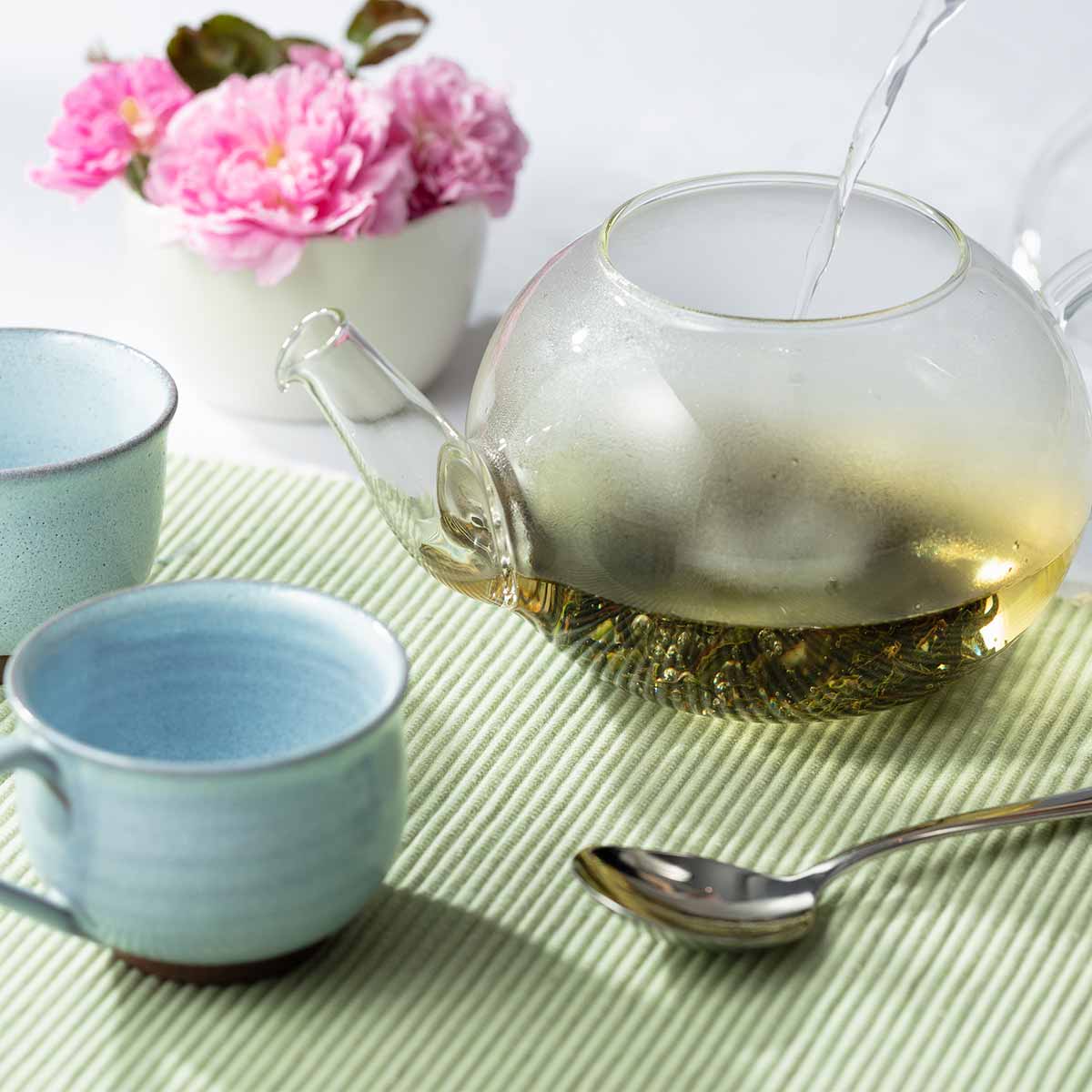Taste is subjective, so there really is no perfect, one-size-fits-all cup of tea. That said, we hope these guidelines help you on your way to finding your ideal cup.



Ultimately, if you like your tea stronger, add more leaves, less and hotter water, and brew longer. The opposite holds true for weaker tea. Then you just tinker with the variables to find your fit. That’s the short version of what’s to follow!
We suggest 2 teaspoons (2.5g) of tea leaves per 200ml of filtered tap water. A little set of scales will help with consistency, but obviously isn’t essential. Just be aware that whole-leaf teas are voluminous compared to broken-leaf teas, so it is difficult at first to judge their weight.
Once weighed, pop the leaves in a warmed teapot and breath in the first release of volatile aromas – always a joy and a signal of what’s to come.
The right water temperature is essential for making a balanced cup of tea, so another useful aid is a temperature-controlled kettle (more on this below). If the water temperature is too high it can destroy the aromas and flavours of your tea leaves, and if it’s too low it will not extract enough flavour.
Generally, less oxidised teas (such as green tea) need cooler water to achieve a fresh and sweet infusion, and more oxidised, stable teas (black and darker oolongs) need hotter water to extract richer, more complex and fruity notes.
Pouring boiling water on a delicate green tea will turn sweet and elegant notes to that of boiled cabbage. The structure of the liquor will also change, becoming thinner, with a metallic edge.
In contrast, tepid water will not extract sufficient tannins and flavour from black tea, resulting in tea with an incomplete flavour profile that is lacking in body. Don’t steep for too long though, or the tea will develop an astringent mouthfeel, will taste bitter and flat, and will only really be palatable with sugar and milk.
Moreover, once over-steeped, or stewed, the leaves won’t brew up a second or third cup, meaning you don’t get the full enjoyment of your whole-leaf tea. Better to set a timer, relax and enjoy multiple, flavoursome infusions.
We suggest you try a first infusion time of two minutes for a lighter brew, or three minutes for more oomph, adding around 30 seconds for each subsequent infusion. Large, whole leaves like ours have less surface area than broken leaves or fannings, meaning they do need more time than a tea bag tea to brew fully and appreciate.
So, it occurs to us that prose makes the mindful ceremony of brewing a cup of tea sound rather less zen, but we do hope these notes help you on your way to brewing great loose leaf tea.
On a final note, we also must confess that while we’ve described some gadgets – a timer, scales and temperature-controlled kettle – as helpful, we really prefer not to be without them when brewing. They do enable you to replicate your preferred cup once found, which is a bonus when you brew epic proportions of tea like we do.

The ideal water for tea has a balance of minerals and a neutral taste. Very few of us are lucky enough, however, to have access to fresh mountain spring water, so tap water usually does just fine.
However, if you don’t like the taste of your tap water, we’d recommend filtering before brewing. We use a Brita jug filter to reduce hardness, chlorine and impurities, all of which can impair the aromas and flavour of your tea.
Some folks have a favourite bottled mineral water for brewing tea, but bottled water can be too high in mineral content, adding a harsh taste to your tea. On the contrary, distilled water, stripped of minerals, will taste flat and lifeless.
A temperature-controlled kettle removes the guess work from your tea brewing. However, there are other ways to gauge the temperature.
As a rule of thumb, boiling water cools down by roughly ten degrees for every ten per cent of cold water added. So, to brew tea at 90°C, boil a litre of water then add 100ml of cold water. In the Japanese tea ceremony, decanting hot water from one vessel to another is also said to drop the temperature by around ten degrees. These are imperfect sciences, of course, and there are a few moving variables, but our Jersey Fine Tea is really quite forgiving.
Another, more poetic, method of finding the right water temperature is to listen to the water: when it sounds like a babbling brook – all bursting, splashy bubbles – it’s good for brewing green tea. And when it sounds like a freak storm in the desert, maybe brew black. We’ve not mastered this, by the way, just sharing.😬
Lastly, don’t forget to use freshly drawn water. Stale water will make a musty cup of tea and water left to boil furiously, or repeatedly, is depleted of its dissolved oxygen content, so lacks liveliness.


Tea pots come in all shapes, sizes and materials. Choose one to suit the number of cups to be poured, making sure there are no leaves left steeping after you’ve decanted – you want to enjoy subsequent infusions and the changing flavours. An alternative is to decant through a strainer into a separate warmed pot then pour.
You can also opt for a teapot with removable straining basket, and you get smaller versions to fit a mug or cup which are super convenient. We suggest you avoid metal ball infusers for our tea – Jersey Fine Tea leaves are just too large to fit inside without breaking them, and there is no room for the leaves to swell and release their flavours once wet.
We personally love glass teapots, partly because they can be easily cleaned but also because you can enjoy the visual performance of the swelling leaves and judge the tea’s readiness by the colour of the liquor.
Glazed pottery and porcelain also make good teapots, but silverware and stainless steel are less successful as they can retain the flavour of the last tea brewed.
Peacock Farm
Rue de la Pièce Mauger
Trinity
Jersey JE3 5HW
Channel Islands
By signing up, you accept the terms of Jersey Fine Tea’s Privacy Policy and consent to receive our emails. You can unsubscribe at any time.